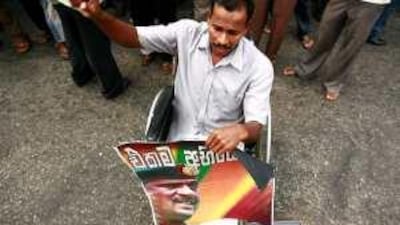COLOMBO // While most people believe the ruling party of the Sri Lankan president, Mahinda Rajapaksa, will win next month's parliamentary election, the main opposition party is banking on a repeat of the December 2001 poll when the two biggest parties began sharing power.
That relationship was fraught with tensions from the beginning and ended after just two years, and analysts say any power sharing agreement, either between parties in government or between Mr Rajapaksa and a government led by a party opposed to him, would probably result in chaos. "I don't think the opposition can win enough seats. However even if they are able to win and form a government, parliament won't last for a year because there will be bitter confrontation" between the government and the president, said Mohamed Ayub, a journalist with the local Daily Mirror newspaper.
On Monday, the opposition United National Front (UNF) told reporters that Sri Lanka could prosper if power could be shared between itself and the United People's Freedom Alliance (UPFA) led by Mr Rajapaksa. "A UPFA president and a UNF-led government would be the best option for the country," said the former UNF parliamentarian Gayantha Karunatilleke. He said such a move would ensure proper checks and balances and reduce any undemocratic moves by either party in governing the country.
Polls are scheduled for April 8 and intensive campaigning has begun with support split between the two parties. The UNF is led by Ranil Wickremesinghe, who was prime minister in the 2001-2004 coalition government under a UPFA president. The Democratic National Alliance (DNA), led by the defeated presidential candidate and former army commander, Sarath Fonseka, is also likely to claim a number of seats. Mr Fonseka is in detention and faces a court martial over claims he violated army rules by being involved in politics while serving in the army, among other charges.
Most analysts believe the ruling party will secure more than half of parliament's 225 seats, although there is a possibility of the UNF cobbling together a slim majority by allying with smaller parties, including those representing Tamil minority interests. Kusal Perera, an analyst and columnist with the Daily Mirror, said the situation was different in 2001-2004 when the UNP shared power under the then president Chandrika Kumaratunga of the UPFA. "That effort at sharing power - which many people hoped would succeed - failed as Ranil Wickremasinghe often created problems for Mrs Kumaratunga, resulting in the latter dissolving parliament," he said.
Under the constitution, the president - who is elected separately at a presidential poll, the latest of which was held in January - has wide executive powers to appoint a cabinet with whomever he or she wants, even if parliament is made up of a majority of opposition members. The president can also dissolve parliament after one year of a parliamentary poll, something analysts believe could happen if the UNP wins on April 8.
"What may happen is an attempt by the president to actually prevent the assumption of parliamentary power [by the opposition] by means of delaying convening parliament to give time for his party to coerce and buy up opposition MPs to crossover in an attempt to rebuild a UPFA-led government," a former newspaper editor said. Declining to be named for fear of repercussions, the former editor said that even if the UNF were to succeed in forming a government, its tenure would be short-lived. "It will be one of the worst episodes of governance Sri Lanka would have ever experienced since independence because the Rajapaksa regime is filled with incompetent and inexperienced people who lack capacity to have sophisticated, pragmatic, working arrangements with groups that they do not trust or agree with."
When Sri Lanka's two opposition parties began an uncertain process of sharing power after the December 2001 parliamentary poll, Sri Lankans - although sceptical - were hoping the "experiment" in power sharing would work. The two parties have taken turns in ruling the country but were always on a confrontational course after Sri Lanka gained independence from British rule in 1948. One of the reasons for the nearly 30 years of ethnic conflict with Tamil Tiger rebels was because of disagreement between the two main parties on a political solution or ways of winning the war.
The conflict ended in May 2009 with government troops crushing the rebels, who were backing demands by the Tamil minority community for more administrative and political power in the north and east, where most of them lived. "If both parties work together for the benefit of the country, all our problems would be solved and we would be a peaceful nation," said one analyst at the time the UNF won the December 2001 poll.
Now most believe that eventuality is highly unlikely and warn against any power-sharing government. "The president will appoint his own ministers, exercise control and give a few, small positions to the opposition party," said the journalist Ayub. "The country will be unstable and hit rock bottom." foreign.desk@thenational.ae

